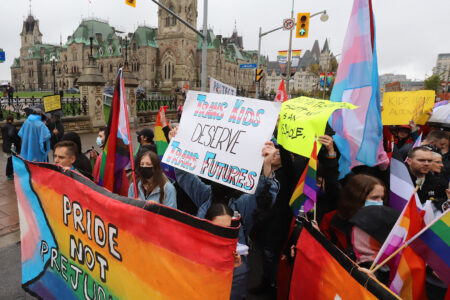
Prime Minister Trudeau’s letter outlining the new appointment process for Supreme Court justices has caused quite a stir.
The new process should be lauded for its transparency. At a minimum, we now know the basic process for how justices will be selected, which is a departure from the ad hoc and shifting approaches of previous governments (both Conservative and Liberal). The proposal also has admirable goals: an open application process, a nomination board with highly qualified professionals, a chance for members of Parliament to question the nominee and a requirement that the appointee be bilingual while also representing “the diversity of our great country.”
The value of some of these elements can — and surely will — be debated for some time. There are a number of valid questions: will MPs politicize the process with their questions? Will the bilingualism requirement narrow the pool of applicants? How will the focus on greater diversity impact the concept of merit?
But the fact that applications to fill a vacancy can come in from across the country has been the most unexpected aspect of the new process. The issue here is the potential for the government to break from the practice of ensuring regional representation on the Supreme Court. When Justice Thomas Cromwell, from Nova Scotia, retires next month, convention dictates that his replacement should also be from Atlantic Canada. The Minister of Justice, responding to the criticism, has clarified that while Atlantic Canadians will be considered, “the next appointment…will not necessarily be a person from Atlantic Canada,” while also saying, “We recognize the importance of regional representation.”
This is far from a guarantee for Atlantic Canada.
Divvying up the seats on the Supreme Court by region can be traced back to the institution’s founding. The focus tends to be on Quebec’s three seats, guaranteed by law (and now by the Constitution, as the decision on the failed appointment of Justice Marc Nadon clarified). But the other regions also expect to be represented: over time this has meant that three justices come from Ontario, two from the West and one from the East. This formula has almost always been maintained, and any deviations from it have quickly been rectified. Indeed, the importance of regional affiliation was encapsulated in a 1983 speech that Justice Jean Beetz (from Quebec) gave on how one qualifies to become a member of the Supreme Court. After reflecting on the personal qualities of a judge, like prudence, wisdom and good judgment, he told the audience at York University that what really mattered was luck: you have to come from the region where there is a vacancy.
Now, finding the best judges in the country should not be left up to chance. So why maintain the practice of regional representation? The answer is legitimacy.
The Court is one of the most important political institutions in the country. Its decisions affect the lives of Canadians in countless ways, from defining our basic rights (like the right to assisted death) to settling federal-provincial conflicts over the design of our democratic institutions (like reforming the Senate). Some criticize the Court’s power, given that it is an unelected body. But this power is one of the reasons why maintaining a link to regions is important.
The Court is not just a legal body; it is one of our key federal institutions. It is the “guardian of the Constitution,” as it likes to say. In this role, it is supposed to bring the various perspectives from the different regions of the country to bear on the questions of the day. This view is what guided its decisions in the Nadon affair and the reference to the Court on Senate reform. The Court was clear in these cases that protecting provincial interests within our national institutions was a key part of the federal pact.
The Liberals seem to have decided that reflecting the diversity of Canada, writ large, is more important than ensuring regional representation. This is not necessarily a bad thing: it is a very Trudeauvian approach to federalism, focusing on individuals over provinces. Making choices when it comes to competing diversities is a hard thing to do.
At the same time, does this regional representation really matter beyond the symbolic? Judges are people, and they do bring with them their own unique perspectives when carrying out their duties. So you would assume the answer is yes. But judges — particularly those who are elevated to the highest court in the land — are also outstanding lawyers who have been trained and indoctrinated to push aside their own beliefs in service to the law.
Political scientists have long studied the behaviour of judges to confirm whether their personal beliefs do actually affect their decisions. Studies of the US Supreme Court clearly show that the ideology of the judges (as liberal or conservative) plays a significant role in their decisions. This is less the case in Canada, but for a few judges their ideology does affect their track record on certain issues.
I found no real evidence that justices from Quebec actually tended to favour the province in federalism disputes.
When it comes to the regional affiliation of a judge, there is even less evidence that it affects their rulings. While some studies show Supreme Court justices from different regions voted differently in the past, since the Charter of Rights and Freedoms came into effect, these differences have all but disappeared.
In a recent study I looked at how Quebec justices have acted on the Supreme Court as representatives for their home province. This is an area where we could expect to see the strongest possible expression of regional representation. And yet I found no real evidence that justices from Quebec actually tended to favour the province in federalism disputes. In fact, Quebec justices tend to support the federal government (perhaps because they are appointed by the prime minister).
But the power and importance of symbolism should not be underestimated. The Supreme Court itself has been clear that regional representation on the bench is of the utmost importance. The Liberal government would be wise to account for this when it comes time to select a judge from the list of nominees. While it may not ultimately make a large difference in the Court’s rulings in the future, it will certainly affect its (and the government’s) perceived legitimacy in Atlantic Canada.
Do you have something to say about the article you just read? Be part of the Policy Options discussion, and send in your own submission. Here is a link on how to do it. | Souhaitez-vous réagir à cet article ? Joignez-vous aux débats d’Options politiques et soumettez-nous votre texte en suivant ces directives.







